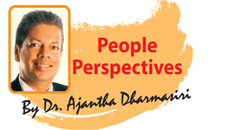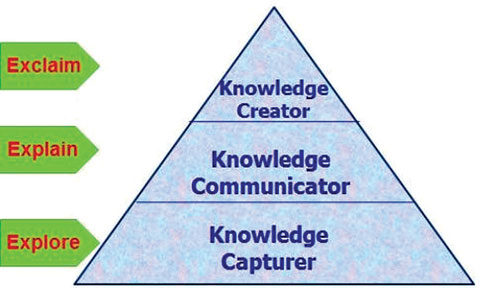Academics as thought leaders
 I was happy to be present at the Annual Research Symposium 2015,
organized by the Faculty of Medicine, University of Colombo as the
Plenary Speaker. As someone not from medicine, I spoke on 'Academics as
thought leaders' highlighting the promises and pitfalls in the Sri
Lankan context. Today's column is an essence of what I have shared. I was happy to be present at the Annual Research Symposium 2015,
organized by the Faculty of Medicine, University of Colombo as the
Plenary Speaker. As someone not from medicine, I spoke on 'Academics as
thought leaders' highlighting the promises and pitfalls in the Sri
Lankan context. Today's column is an essence of what I have shared.
Academics engage in scholarly activities. They deal with knowledge
playing multiple roles.
They have to think and act as knowledge creators and knowledge
sharers. Academics influence the attitudes and aptitudes of the student
community. This is where 'thought leadership' comes to the forefront.
Superiority in scientific thinking, blended with socio-cultural
realities is what a smart academic should possess. It qualifies them to
join the constellation of thought leaders.
In fact, leadership is not about positions and titles but decisions
and actions. It refers to a mindset of influencing, inspiring and
instructing. Leaders as opposed to laggards, deliver results. As it has
been observed, leadership is a vastly explored but least understood
phenomena on earth.
The many definitions of leadership portray its multi-dimensional
nature. Academics should shift from their perennial plight of
'publishing or perishing' to a new paradigm of thought leadership. Such
a transformation needs vision and passion. Overcoming socio-economic and
religio-cultural barriers in moving ahead with strong
intrinsically-driven motivation is the need of the hour.
Triple roles for academics
Academics have a triple role to play. These can be depicted as a
knowledge pyramid of academics. The diagram depicts the details.
 The bottom of the knowledge pyramid remains the role of 'knowledge
capturer'. This includes the learning dimension of an academic. We learn
from the womb to the tomb, as life-long learners. I prefer to be called
a management learner than an 'expert'. This is more relevant in the
context of change, where knowledge rapidly becomes obsolete.
Particularly, in the areas of Information, Communication and Technology
(ICT), the rate of knowledge updating seems more rapid. The bottom of the knowledge pyramid remains the role of 'knowledge
capturer'. This includes the learning dimension of an academic. We learn
from the womb to the tomb, as life-long learners. I prefer to be called
a management learner than an 'expert'. This is more relevant in the
context of change, where knowledge rapidly becomes obsolete.
Particularly, in the areas of Information, Communication and Technology
(ICT), the rate of knowledge updating seems more rapid.
This is where the academics have to explore new knowledge. They
should have the mindset of an explorer. It reminds me of a story that I
heard about an elderly professor. He was serving in a residential campus
in an European city, staying in the upper-most floor of the building
complex.
His room was well lit early morning and the students could see him
reading. The students discussed among themselves as to why this veteran
still gets up so early to read. One student had the guts to ask him, as
to why he does so. The professor gave a profound answer. "I would rather
drink from a flowing fountain than from a stale pond".
Upon reflecting, I was wondering whether we Sri Lankan academics are
more 'flowing fountains' or 'stale ponds'. We might be hurriedly
offering re-cycled knowledge over and again to cater to the
ever-increasing demand for lectures. Hence, the knowledge capturing
dimension suffers and the opportunity to review and renew oneself is
neglected.
The middle part of the knowledge pyramid is all about sharing
knowledge. It highlights the traditional role of teaching. Communicating
knowledge does not necessarily mean lecturing. We at the Postgraduate
Institute of Management (PIM), thanks to the late Prof. Uditha Liyanage,
have been practising, what we call the four modes of teaching - 'tell,
ask, show and do'.
Telling means the typical lecturing. Asking means to engage the
learning community by raising questions expecting answers from them.
Showing refers to audio-visual interventions such as documentaries,
movie extracts, video recordings, internet-based resources such as You
tube. Doing means to get the student community to engage in group
discussions. In a typical three-hour 'session' (we prefer this as
opposed to a lecture), roughly one third would be telling.
I see clear issues among us, Sri Lankan academics in this respect.
Are we loading students with knowledge through a one-way communication,
making them mere receivers? They would easily resort to 'parrot
technique' in memorizing everything and reproducing it at the exam with
spelling and grammar errors.
Are we being challenged by the student community sufficiently, in
leading to a meaningful interactive discussion? I might be biased here
in basing on mostly post-graduate teaching experience. Yet, irrespective
of what level an academic has to tackle, an appropriate adaption is
always possible.
This is where research comes to the limelight. Sri Lankan academics
should reach the pinnacle of the knowledge pyramid by becoming knowledge
creators. Relevant research with rigour and results is the need of the
hour.
I recall reading an article written by Dr Jayaratne Pinikahana
sometime ago, highlighting the need for the private sector to
collaborate in university research. He shared some revealing statistics
about local research.
"Sri Lanka contributes only 0.17% of the GDP for research whereas
Singapore contributes 2.3%, South Korea 2.9% and China 1.3%. A recent
report published by the Ministry of Technology and Research revealed
that Sri Lanka has only 287 researchers per million which is less than
the world average of 894.
"The average number of researchers per million in the developed world
and the developing world is 3,272 and 374. It is clear from these
statistics that the Sri Lankan situation is worse than the average third
world situation. The most alarming situation is that it has got worse in
recent years. For example, in 1996, Sri Lanka had 6,000 full-time
researchers including university researchers but by 2006 this number
declined to 4,200."
In such a context, any move to strengthen research rigour,
particularly among the University community is commendable. There is a
clear need to create better awareness on the importance of research.
This I see acutely in the field of management.
We need to explore this topic further. The next column will add more
insights into academics as thought leaders.
Prof. Ajantha Dharmasiri can be reached through [email protected] or
www.ajanthadharmasiri.info
|

